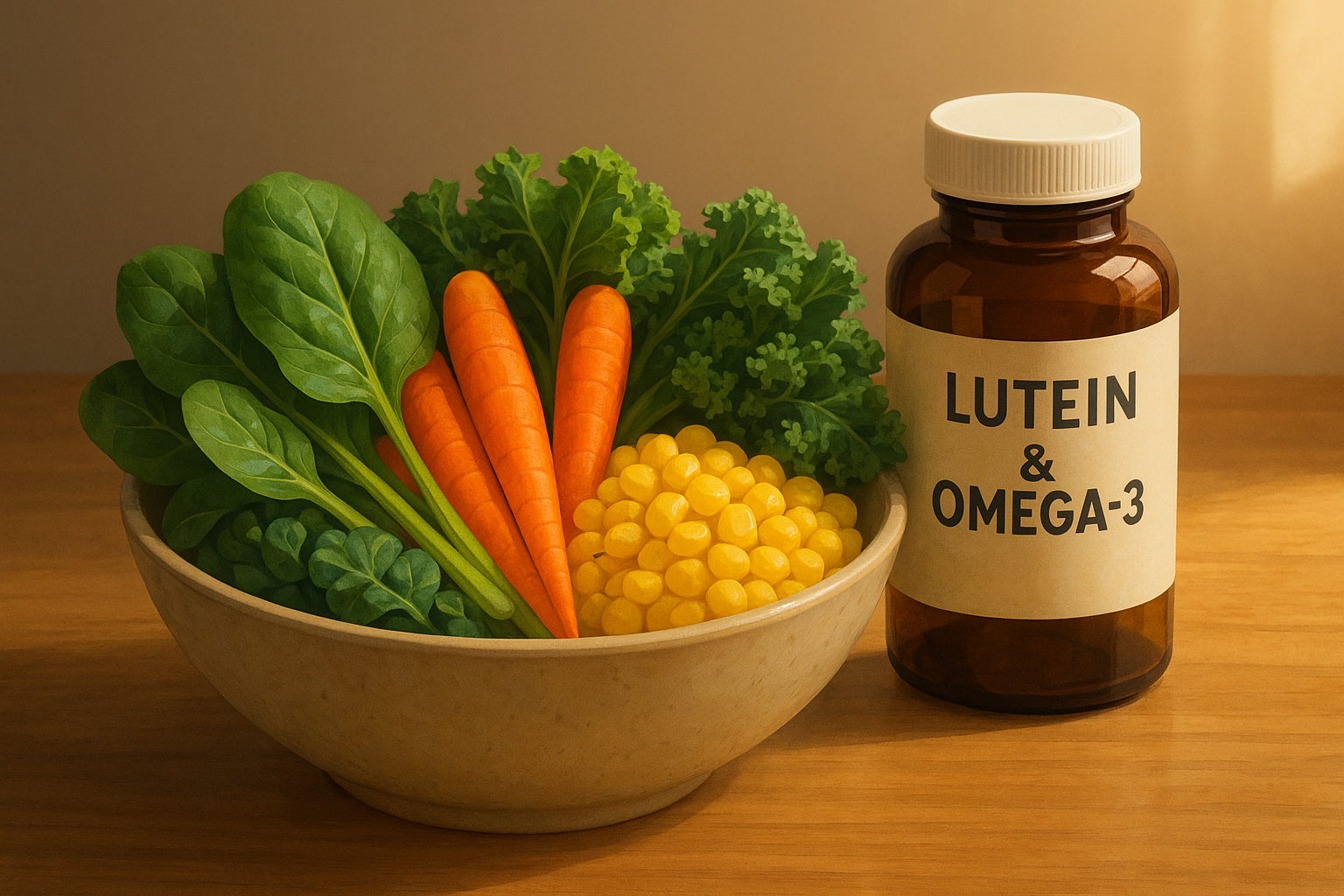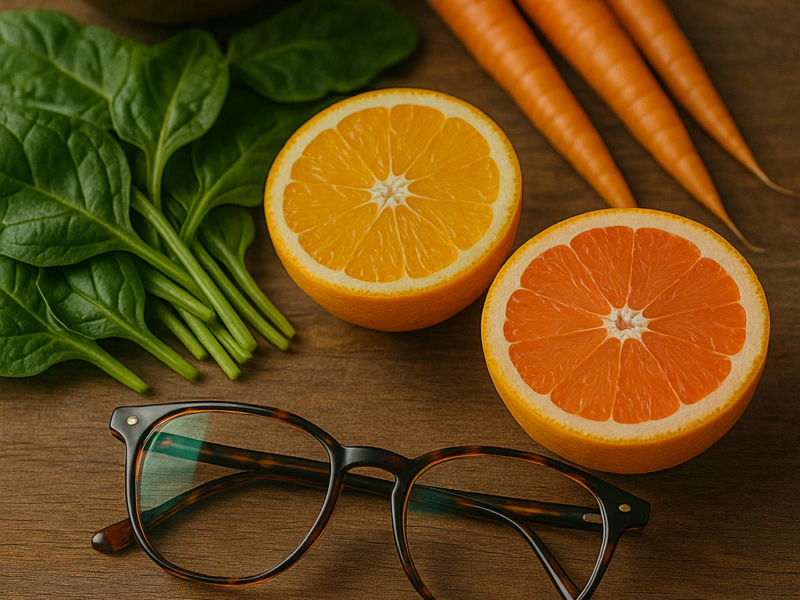Our eyes are constantly exposed to oxidative stress, UV light, and digital screens. Over time, these factors can damage sensitive structures such as the retina and macula. While a healthy diet should always be the foundation of eye health, supplements provide concentrated doses of essential nutrients that can be difficult to obtain in sufficient amounts through food alone.
Several large studies, including the AREDS (Age-Related Eye Disease Study) and AREDS2, have shown that specific combinations of vitamins and antioxidants can slow the progression of AMD and protect against vision loss.
Lutein and Zeaxanthin: The Macular Pigments
What They Are
Lutein and zeaxanthin are carotenoids, plant-based pigments found in green leafy vegetables, corn, and egg yolks. They accumulate in the macula, the central part of the retina responsible for sharp vision.
Benefits for Eye Health
- Protect the retina from blue light damage
- Act as powerful antioxidants, reducing oxidative stress
- Reduce risk of AMD and cataracts
- Improve contrast sensitivity and visual performance in low light
Recommended Dosage
- Typical supplement doses: 10–20 mg lutein + 2–4 mg zeaxanthin per day
- Safe for long-term use, especially in adults over 40
👉 Read more: Nutrition for Vision: Essential Foods and Supplements for Healthy Eyes
Omega-3 Fatty Acids (EPA and DHA)
Why They’re Important
Omega-3 fatty acids are essential for retinal function and tear production. DHA (docosahexaenoic acid) makes up a significant portion of the retina, while EPA (eicosapentaenoic acid) helps regulate inflammation.
Benefits
- Improves dry eye syndrome by enhancing tear quality
- Supports retinal health and reduces risk of AMD
- Beneficial for infant eye development (via maternal diet or supplements)
Sources and Dosage
- Found in fatty fish (salmon, sardines, mackerel) and algae oil (vegan option)
- Recommended intake: 500–1000 mg combined EPA+DHA daily
💡 Did You Know?
The AREDS2 study proved that a specific combination of lutein, zeaxanthin, vitamins C & E, zinc, and copper can reduce the risk of advanced macular degeneration by up to 25%.
Vitamin A: Essential for Night Vision
Vitamin A plays a central role in producing rhodopsin, a pigment necessary for low-light vision. Deficiency can lead to night blindness and severe eye disorders.
- Sources: Liver, dairy, carrots, sweet potatoes
- Recommended daily intake: 700–900 mcg
- Supplements should be used cautiously, as excessive intake can be toxic
Vitamin C and Vitamin E: The Antioxidant Duo
Vitamin C
- Water-soluble antioxidant
- Helps maintain collagen in the cornea
- Reduces risk of cataracts and AMD progression
Vitamin E
- Fat-soluble antioxidant that protects cell membranes
- Works synergistically with Vitamin C
Dosages:
- Vitamin C: 500–1000 mg daily
- Vitamin E: 200–400 IU daily
👉 Related: Dry Eyes: Causes, Symptoms, Prevention, and Treatment
Zinc: The Eye’s Protector
Zinc is highly concentrated in the retina and choroid (vascular layer of the eye). It supports vitamin A metabolism and protects against oxidative damage.
- AREDS studies showed that zinc supplementation significantly reduced progression of advanced AMD.
- Recommended dose: 25–40 mg daily
Other Beneficial Supplements
- Astaxanthin: Potent antioxidant found in algae, shown to reduce eye fatigue from screen use
- Bilberry Extract: Supports night vision and microcirculation in the retina
- Ginkgo Biloba: May improve blood flow to the optic nerve, beneficial for glaucoma patients
- Curcumin (Turmeric Extract): Anti-inflammatory, helpful for uveitis and general eye inflammation
Who Should Consider Eye Health Supplements?
- Adults over 50 (higher risk of AMD and cataracts)
- People with family history of vision disorders
- Smokers (higher oxidative stress and vitamin depletion)
- Those with poor diets lacking in fruits, vegetables, or omega-3 sources
- Anyone experiencing digital eye strain and dry eyes
Are Supplements Safe?
Most supplements for eye health are considered safe when taken in recommended amounts. However, always consult an eye care professional before starting new supplements, especially if you:
- Take prescription medications
- Have chronic diseases (diabetes, heart disease)
- Are pregnant or breastfeeding
👉 Explore more: Macular Degeneration: Early Signs, Prevention, and Effective Treatment Options
💡 Did You Know?
The AREDS2 study proved that a specific combination of lutein, zeaxanthin, vitamins C & E, zinc, and copper can reduce the risk of advanced macular degeneration by up to 25%.
❓ Frequently Asked Questions (FAQ)
Q1: Are supplements really necessary for eye health?
A: If you have a balanced diet rich in leafy greens, fish, and colorful vegetables, you may get enough naturally. But supplements help fill the gap, especially in people at risk for AMD or cataracts.
Q2: Can omega-3 fatty acids improve dry eyes?
A: Yes. Omega-3s (EPA and DHA) improve the quality of tears and reduce inflammation, which helps relieve dry eye symptoms.
Q3: What’s better for vision — lutein or zeaxanthin?
A: Both are carotenoids that protect the macula. They work best together to filter harmful blue light and fight oxidative stress.
Q4: Do multivitamins cover all eye health needs?
A: Standard multivitamins aren’t enough. Eye-specific supplements (AREDS2-based) provide targeted antioxidant and carotenoid support.
Q5: How long does it take for supplements to show results?
A: Studies suggest it can take 3–6 months of consistent use to notice benefits in vision stability or eye comfort.
Conclusion
Supplements are not a replacement for a healthy diet or medical care, but they can play a powerful role in protecting your vision. Lutein, zeaxanthin, omega-3 fatty acids, vitamins A, C, E, and zinc are the most studied and effective.
By combining a nutrient-rich diet, healthy lifestyle habits, and the right supplements, you can significantly reduce your risk of age-related vision loss and maintain sharp eyesight well into old age.
🛒 Recommended Products for Eye Health
1. PreserVision AREDS 2 Formula
– Clinically tested supplement for AMD prevention
👉 Shop PreserVision AREDS 2
2. Bausch + Lomb Ocuvite Adult 50+
– Daily antioxidant support with vitamins C, E, lutein & zinc
👉 Check Ocuvite on Amazon
3. Performance Lab Vision
– Advanced formula with lutein, zeaxanthin, astaxanthin & bilberry
👉 Get Performance Lab Vision
4. Triple Strength Omega-3 Fish Oil
– High EPA & DHA for dry eyes and retinal support
👉 Buy Omega-3 Supplement
5. Nature’s Bounty Vitamin E Softgels
– Strong antioxidant to protect retinal cells
👉 View Vitamin E Supplement
⚡ Pro Tip: Always discuss new supplements with your eye doctor, especially if you already take prescription medications or have chronic conditions.


